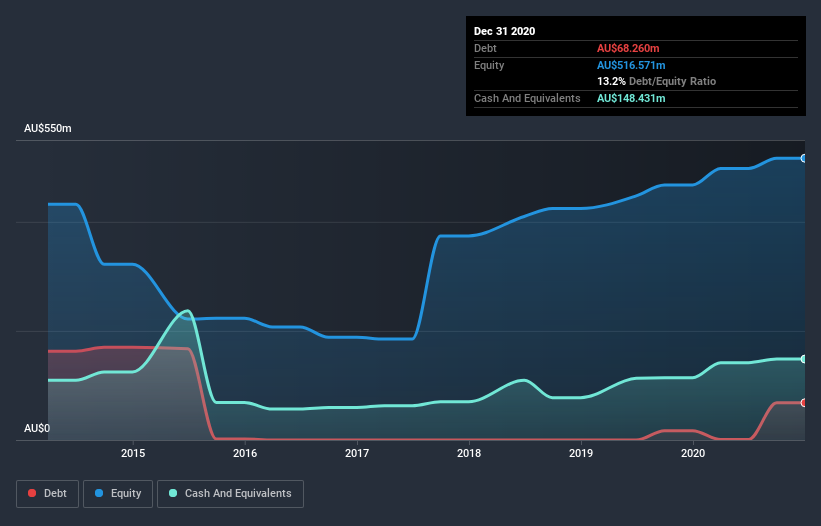The external fund manager backed by Berkshire Hathaway's Charlie Munger, Li Lu, makes no bones about it when he says 'The biggest investment risk is not the volatility of prices, but whether you will suffer a permanent loss of capital.' It's only natural to consider a company's balance sheet when you examine how risky it is, since debt is often involved when a business collapses. Importantly, Macmahon Holdings Limited (ASX:MAH) does carry debt. But the real question is whether this debt is making the company risky.
When Is Debt A Problem?
Debt assists a business until the business has trouble paying it off, either with new capital or with free cash flow. Part and parcel of capitalism is the process of 'creative destruction' where failed businesses are mercilessly liquidated by their bankers. While that is not too common, we often do see indebted companies permanently diluting shareholders because lenders force them to raise capital at a distressed price. Having said that, the most common situation is where a company manages its debt reasonably well - and to its own advantage. When we examine debt levels, we first consider both cash and debt levels, together.
Check out our latest analysis for Macmahon Holdings
What Is Macmahon Holdings's Debt?
You can click the graphic below for the historical numbers, but it shows that as of December 2020 Macmahon Holdings had AU$68.3m of debt, an increase on AU$17.1m, over one year. However, it does have AU$148.4m in cash offsetting this, leading to net cash of AU$80.2m.

How Strong Is Macmahon Holdings' Balance Sheet?
The latest balance sheet data shows that Macmahon Holdings had liabilities of AU$269.4m due within a year, and liabilities of AU$216.4m falling due after that. Offsetting this, it had AU$148.4m in cash and AU$206.2m in receivables that were due within 12 months. So its liabilities total AU$131.1m more than the combination of its cash and short-term receivables.
While this might seem like a lot, it is not so bad since Macmahon Holdings has a market capitalization of AU$472.5m, and so it could probably strengthen its balance sheet by raising capital if it needed to. However, it is still worthwhile taking a close look at its ability to pay off debt. Despite its noteworthy liabilities, Macmahon Holdings boasts net cash, so it's fair to say it does not have a heavy debt load!
Another good sign is that Macmahon Holdings has been able to increase its EBIT by 22% in twelve months, making it easier to pay down debt. The balance sheet is clearly the area to focus on when you are analysing debt. But ultimately the future profitability of the business will decide if Macmahon Holdings can strengthen its balance sheet over time. So if you want to see what the professionals think, you might find this free report on analyst profit forecasts to be interesting.
Finally, a company can only pay off debt with cold hard cash, not accounting profits. Macmahon Holdings may have net cash on the balance sheet, but it is still interesting to look at how well the business converts its earnings before interest and tax (EBIT) to free cash flow, because that will influence both its need for, and its capacity to manage debt. During the last three years, Macmahon Holdings generated free cash flow amounting to a very robust 85% of its EBIT, more than we'd expect. That positions it well to pay down debt if desirable to do so.
Summing up
Although Macmahon Holdings's balance sheet isn't particularly strong, due to the total liabilities, it is clearly positive to see that it has net cash of AU$80.2m. The cherry on top was that in converted 85% of that EBIT to free cash flow, bringing in AU$48m. So we don't think Macmahon Holdings's use of debt is risky. When analysing debt levels, the balance sheet is the obvious place to start. But ultimately, every company can contain risks that exist outside of the balance sheet. To that end, you should be aware of the 2 warning signs we've spotted with Macmahon Holdings .
At the end of the day, it's often better to focus on companies that are free from net debt. You can access our special list of such companies (all with a track record of profit growth). It's free.
If you’re looking to trade Macmahon Holdings, open an account with the lowest-cost* platform trusted by professionals, Interactive Brokers. Their clients from over 200 countries and territories trade stocks, options, futures, forex, bonds and funds worldwide from a single integrated account. Promoted
New: Manage All Your Stock Portfolios in One Place
We've created the ultimate portfolio companion for stock investors, and it's free.
• Connect an unlimited number of Portfolios and see your total in one currency
• Be alerted to new Warning Signs or Risks via email or mobile
• Track the Fair Value of your stocks
This article by Simply Wall St is general in nature. It does not constitute a recommendation to buy or sell any stock, and does not take account of your objectives, or your financial situation. We aim to bring you long-term focused analysis driven by fundamental data. Note that our analysis may not factor in the latest price-sensitive company announcements or qualitative material. Simply Wall St has no position in any stocks mentioned.
*Interactive Brokers Rated Lowest Cost Broker by StockBrokers.com Annual Online Review 2020
Have feedback on this article? Concerned about the content? Get in touch with us directly. Alternatively, email editorial-team (at) simplywallst.com.
About ASX:MAH
Macmahon Holdings
Provides surface mining, underground mining and mining support, and civil infrastructure services to mining companies in Australia and Southeast Asia.
Undervalued with excellent balance sheet.
Similar Companies
Market Insights
Community Narratives



